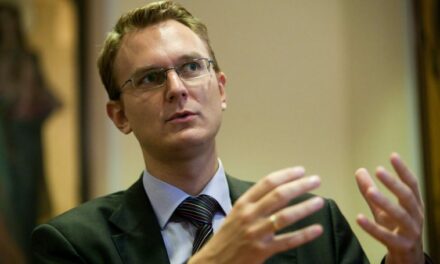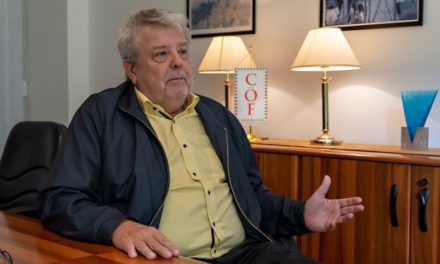In order to define Hungary's place in the world, we must first be able to define who we are and what opportunities we have - State Secretary Illés Boglárka introduced his chosen topic in his opening speech, emphasizing that we Hungarians want to increase the number of our contacts with other countries, even the " also in the world of "blocking". Below is the Hungarian translation of the Secretary of State's entire speech in English.
Ladies and Gentlemen,
It is an honor to speak before you and a pleasure to open this very important conference.
Allow me to convey the greetings of Minister Péter Szijjártó.
The topic and title of my opening speech is "Connectivity or blocking: Hungary's place in the world"
The first aspect we need to consider is our physical-geographical location. This is a given and thus determines our geopolitical opportunities.
Like it or not, our country is located right between the West and the East, and accordingly we cannot afford to ignore one or the other, or to cut ties with one or the other.
Hungary cannot change its "residential address", so adapting to this fact is a prerequisite for future success.
In addition to our geopolitical situation, we must also consider the size of our country, as overestimating and underestimating ourselves can lead to incorrect decisions.
Hungarians are a small nation that ranks 95th in the world in terms of population. In concrete terms, this means that there are 15 million Hungarians living in the world, and approximately 13 million of them speak Hungarian. In total, less than 10 million Hungarians live in their motherland, Hungary.
This is perhaps one of the biggest problems, since for historical reasons the borders of Hungary and the territories inhabited by Hungarians do not coincide, and as a result, for example, Hungarian foreign policy aspirations cannot be separated from the fact that it must also protect the interests of Hungarians across the border.
Our culture and society are also determined by the fact that Hungary is a more than 1,000-year-old state that grew out of Judeo-Christian culture and can only exist on this (cultural) basis.
This is important to understand and be aware of, because it also shapes Hungarian foreign policy; and a country with such a past cannot walk with its head lowered.
We are proud of our culture, our thousand-year history, and we are not willing to sacrifice all of this to fleeting ideological flare-ups.
What also affects our freedom of movement is the fact that Hungary does not border any sea. Because of this characteristic - and because of the lack of energy carriers, raw materials, and mineral resources - our country decided to join world trade through its hard-working and well-educated workforce and investment incentives. Accordingly, the standard of living of Hungarians was built on an essentially export-oriented economy.
Thus, we Hungarians have an economy that is deeply embedded in the world economy due to its geographical location and size, but because of this, we are also sensitively affected by global economic changes.
As a result, Hungary's foreign policy is unthinkable without the integration of its own economic interests, i.e. its foreign economy, into the areas of foreign policy activity.
Taking these into account, it is very important to choose the Hungarian foreign policy directions correctly.
And for that we need an accurate compass to show us the way even in the biggest storms. The foreign policy compass of the Hungarian government is a simple sentence.
We do not start from who and what is expected of us. We don't want to see ourselves through other people's eyes.
Our goal is to represent Hungary's interests abroad, and not foreign interests in Hungary - despite increasing foreign pressure.
This goal is also a stand against the liberal mainstream, because unlike many European countries that side with Brussels, we pursue a sovereign, nationally based foreign policy.
May I legitimately ask how this is possible?
Hungary has an excellent quality, which is also the basis of our independent foreign policy: the support of the Hungarian people.
The results of this year's EP elections in Hungary proved once again that Hungarian voters continue to support the goals of the Hungarian government: we enjoy the highest ever support in the history of EP elections, and this showed that people do not ask for war, migration or from "gender tyranny".
The election results can also be seen as a confirmation of the 2/3 majority of the government that has been in power for more than 14 years.
As a result, the room for maneuver in Hungarian foreign policy remained wide, the legality of Hungarian foreign policy is unquestionable, and we can continue independent, sovereign Hungarian foreign policy.
Thanks to our political legitimacy, Hungary is able to make rational decisions that actually serve the interests of the Hungarian people in a world that will soon split into blocs.
And we need these decisions, as we somehow have to cope with the uncertain international situation, since Europe is living in an era of dangers and crises.
Security on our continent has become a critical issue, as our eastern neighbor is threatened by the escalation of the Russian-Ukrainian war, and the October 2023 terrorist attack in Israel once again set the Middle East on fire. Illegal immigrants are pouring in from the south, and Africa's population is estimated to grow by 750 million over the next 20 years.
Europe's economic indicators show a decline after the Russo-Ukraine war finally shook the European economic machine, which in previous decades could function successfully thanks to the combination of cheap energy from the East and advanced technology from the West. The EU lost 1 year of GDP growth due to dwindling Russian energy sources, and then had to find a new way to buy energy (LNG - liquefied natural gas) and develop new infrastructure. EU companies pay 2-3 times more for electricity and 4-5 times more for gas than US companies. So, today we can talk about a decline in European competitiveness, rather than potential economic growth.
And if we examine the state of European democracy, we don't get a much better picture either: the gap is growing between the mainstream liberal ideology that champions diversity and aspires to rule, and the sovereignist, patriotic forces that act as a counterweight.
Anyone who dares to question the "post-Christian" and "post-national" transformation of the continent will at best be stigmatized, at worst economically disabled, or - as they tried this year - physically destroyed.
European citizens who are patriotic must be disappointed to see how the European institutions - which claim to be independent, but are controlled by the European Council - live in a delusion and how they increasingly become the executors of mainstream political views. Nowadays, it is therefore not surprising that the Patriots, the 3rd largest party in the European Parliament, were not allowed to get any position after the EP elections.
The Hungarian interest clearly dictates that we should not isolate ourselves, but rather expand our relationship system in the face of challenges like this.
Although Hungary is part of the transatlantic federal system, it is in its interest to remain open to all parts of the world. The development of the relationship system is therefore vital for us, and we must apply not only for positions that appear in the transatlantic envelope, but also for those that are outside, in the world. If we scan the horizon a little more, we see that we are part of a huge, global majority, even though the transatlantic communities are trying to make us believe that we are under blockade, that we are isolated. What the world does not understand is, for example, that while Europe has always called for an immediate ceasefire and diplomatic solutions to resolve distant armed conflicts, in the case of the Russian-Ukrainian conflict - which is practically taking place on our continent - Europe is adding fuel to the fire by using weapons supports the conflict and tries to immediately silence all pro-peace voices. So, although the foreign policy of peace - which is also fundamentally in Hungary's interest - is in the minority in Europe, it receives significant recognition from the majority of the world. This is a promising result that must be maintained.
We must keep diplomatic channels open in order to develop our relationship system.
We Hungarians want to increase the number of our contacts with other countries, even in the world of "blockade".
Hungary has learned from the four-decade cold war, from the struggle between East and West that took place above us. Nothing good comes from a blocky world. This experience is still valid today.
That is why we believe that in these times of war, the primary task of diplomacy is to build bridges and not to widen chasms.
That is why Hungary tries to talk to each of its partners based on mutual respect.
We do not comment on the institutions or domestic politics of other countries. We don't think it belongs to us.
All we ask of our partners is that they speak to us in a tone of mutual respect, as we do, and that we look for common points that bring us together.
Ours is therefore a positive, cooperative foreign policy without the tone of instruction, and which treats its partners as equals, and therefore expects the same attitude and approach from them.
Starting from this point of view, Hungary sees the cooperation between East and West as a great opportunity and not a danger or risk.
And anyone who follows Hungarian foreign policy knows exactly that we boldly voice this everywhere: from Brussels, through Moscow, all the way to Washington.
It is in Hungary's interest to have a civilized economic cooperation between the East and the West, and we are ready to ensure this.
In recent years, political decisions have been made - mainly in Brussels - that replace the traditional drive with an electric one, or in other words: that transform the European car market into an electric one. These decisions were based on the fact that without a large-scale electric transition, global climate protection is doomed.
This technological revolution has a huge impact on us, as the production value of the Hungarian automotive industry has nearly quadrupled since 2014: the sector employs approximately 150,000 people and last year's production value was close to HUF 13,700 billion, i.e. EUR 35.8 billion.
In 2018, Hungary entered the ranks of the first 20 car exporting countries, which together are responsible for 90 percent of the world's car exports.
Last year, more than 500,000 passenger cars rolled out of Hungarian factories.
Thanks to new developments and capacity increases, as well as the investments that will take place soon, we will be able to double this record performance within a few years and increase the number of manufactured cars to over 1 million per year. There are only 5 countries in Europe that can produce this amount.
With the fact that five of the world's ten largest battery manufacturing companies are present in Hungary, we can count on the great success that a country of barely 10 million people has become a meeting point for Eastern and Western companies.
This position guarantees that Hungary will be at the forefront of the automobile manufacturing revolution in the coming years.
The goal of Hungarian foreign policy is therefore clear: Hungarian interests must continue to be represented.
In order to develop its relationship system, Hungary will continue to seek cooperation opportunities with all its partners through dialogues based on mutual respect.
We hope that more and more countries will appreciate this pragmatic approach to Hungarian foreign policy.
Ladies and Gentlemen,
I wish you a fruitful and instructive conference, fruitful dialogues and forward-looking ideas!
Thank you for listening to my speech!













